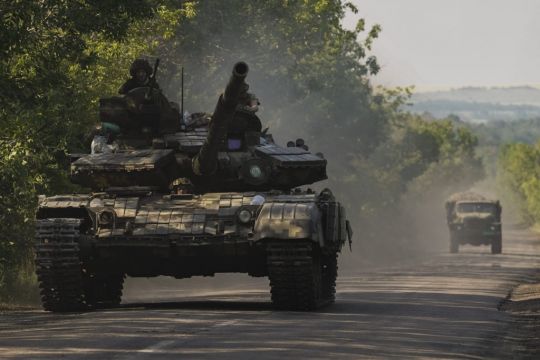Russian forces are relying on weapons with the potential to cause mass casualties as they try to make headway in capturing eastern Ukraine, defence officials claim.
Russian bombers have likely been launching heavy 1960s-era anti-ship missiles in Ukraine, the UK’s Ministry of Defence and Ukrainian officials said.
The Kh-22 missiles were primarily designed to destroy aircraft carriers using a nuclear warhead. When used in ground attacks with conventional warheads, they “are highly inaccurate and therefore can cause severe collateral damage and casualties”, officials warned.
Both sides have expended large amounts of weaponry in what has become a grinding war of attrition for the eastern region of coal mines and factories known as the Donbas, placing huge strains on their resources and stockpiles.

Russia is likely using the anti-ship missiles because it is running short of more precise modern missiles, officials said.
Meanwhile, a Ukrainian regional governor has accused Russia of using incendiary weapons in the village of Vrubivka in eastern Luhansk province, south-west of the fiercely contested cities of Sievierodonetsk and Lysychansk.
While the use of flamethrowers on the battlefield is legal, Serhii Haidai, governor of Luhansk province, alleged the attacks overnight into Saturday caused widespread damage to civilian facilities.
Mr Haidai wrote on Telegram on Saturday morning: “Information about the number of victims in Vrubivka, in the Popasnyanska district, is being specified. At night, the enemy used a flamethrower rocket system – many houses burnt down.”
He also said Russian forces continued their assault on Sievierodonetsk and were destroying critical industrial facilities, including railway depots, a brick factory and a glass factory in neighbouring Lysychansk.
“(Russians are) destroying world-famous factories,” he said. “Thousands of Sievierodonetsk residents dream of returning and crossing the first checkpoint at Azot (a chemical plant), but the enemy is destroying both the city itself and the chemical industry.

During a visit to Kyiv by the European Union’s top official, Ukrainian President Volodymr Zelensky called for a new round of “even stronger” EU sanctions against Russia.
He called for sanctions targeting more Russian officials, including judges, and to hamper the activities of all Russian banks, including gas giant Gazprom’s bank, as well as all Russian companies helping Moscow “in any way”.
He spoke during a brief press appearance with European Commission President Ursula von der Leyen at the heavily guarded presidential office compound in Kyiv.
The pair discussed Ukraine’s aspirations for EU membership, with Mr Zelensky saying Ukraine “will do everything” to integrate with the bloc.
Ms Von der Leyen praised Ukraine’s “strength and resilience” in the face of Russia’s “horrible and atrocious” invasion, and said the EU would assist with reconstruction so the country can “rise from the ashes”.
She added: “We are mourning with you. We share the tears with you.”
Civilians have fled the intense fighting in eastern Ukraine, with women, children and elderly residents leaving on a special evacuation train that departed from the city of Pokrovsk and headed west.

Svitlana Kaplun, whose family fled as shelling reached their neighbourhood in the city of Krasnohorivka, said: “We live on the front line now. The kids are worried all the time, they are afraid to sleep at night, so we decided to take them out.”
After a bungled attempt to overrun the capital Kyiv in the early days of the war, Russia shifted its focus to an eastern region of coal mines and factories known as the Donbas.
The area borders Russia and has been partly controlled by Moscow-backed separatists since 2014.
The fighting there has led to mounting casualties and renewed pleas from Ukraine to the West for more weapons.
Mykhailo Podolyak, an adviser to Ukraine’s president, told the BBC in an interview aired on Thursday that the daily loss of 100 to 200 Ukrainian soldiers is the result of a “complete lack of parity” between Ukraine and Russia.
He said only more advanced Western weaponry will turn back the Russian offensive and force Moscow to the negotiating table.
Fighting in the Donbas has now ground on for more than two months. A provincial governor said Russian and Ukrainian forces battled “for every house and every street” in Sievierodonetsk, a city that has recently been under steady attack.
Sievierodonetsk is in the last pocket of Luhansk province that has not yet been claimed by Russia or Moscow-backed separatists. The Luhansk and Donetsk regions together make up the Donbas.







